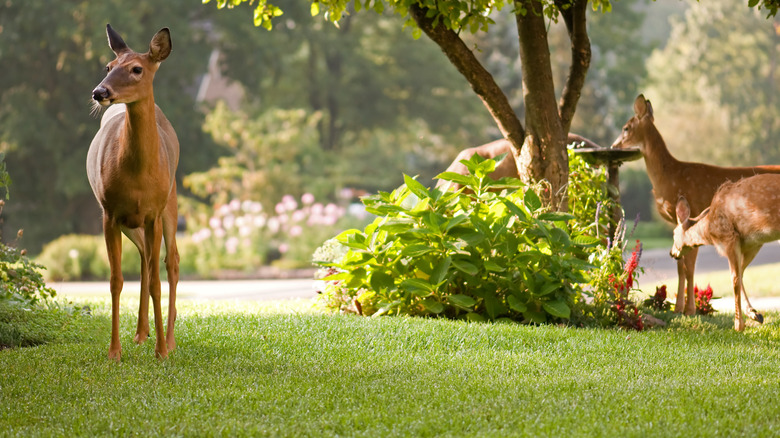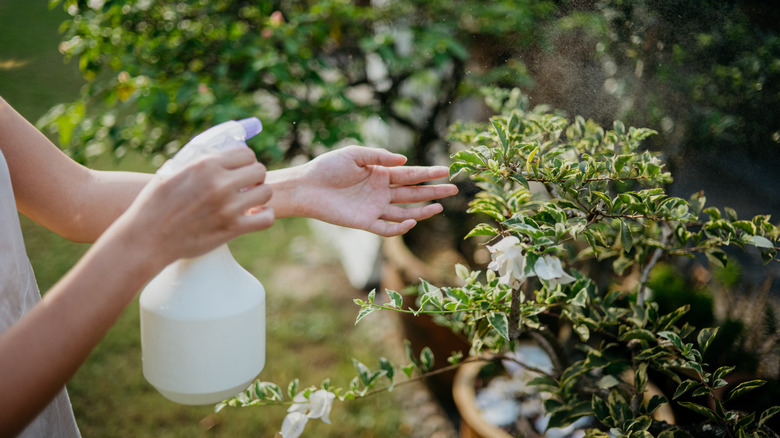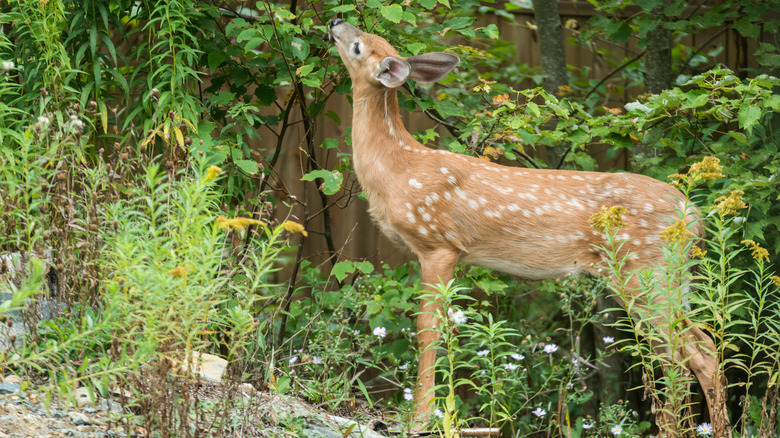Keep Deer Out Of Your Garden With This DIY Milk Spray
At first glance, seeing a majestic buck calmly strolling through your backyard may elicit feelings of awe and excitement. But a longer look reveals the graceful stag bellying up to your garden like it's a Vegas buffet and suddenly you're feeling far from warm and fuzzy. Rather than helplessly stand by and watch the landscape you tirelessly toiled to refine turn into lunch for Bambi and his brood, consider protecting it with a DIY milk spray. The deer deterrent is not only easy to make, it's also environmentally friendly.
Similar to dogs, deer have a highly developed sense of smell that's up to 1,000 times more acute than a human's. Their superior ability to sniff allows them to detect predators from afar and track down food sources, much to the chagrin of homeowners trying to grow healthy gardens. Fortunately, savvy landscapers can use a deer's excellent olfactory ability to their advantage. Since deer steer clear from anything that smells remotely unpleasant to them, one of the best ways to keep deer out of your yard is with items they find repulsive, including garlic, thyme, lavender — and milk.
It makes sense that strongly scented herbs and aromatic plants would drive deer from a garden, but why would milk be revolting to them? The answer: time. Left out in the elements, milk rots and its sour scent clouds deers' sense of smell, leaving them vulnerable to predators. Rather than risk their safety, deer will abandon areas that contain offensive-smelling items, like milk.
How to make DIY milk spray to deter deer
This homemade deer deterrent can be made with any type of milk — whole, 2%, skim, or buttermilk. While fresh milk is acceptable, the spray will be more effective if the milk has been left out of the refrigerator for at least 24 hours. Remember, the goal is to create rotten milk that smells as disgusting as possible. Next, transfer the milk into a spray bottle. If the milk has curdled or is too thick, place it in a blender, add some water, pulse for a minute, then strain the mixture before pouring it into the spray bottle. If you're feeling extra aggressive, consider increasing the potency of the milk spray by adding a beaten egg to the mixture. The combination of rotten eggs and milk baking on sun-drenched vegetation will create a pungency capable of driving away the hungriest deer.
Once outside, liberally spray the milk solution, making sure to cover the entire plant, including stems, leaves, fruits, and vegetables. Saturating crops with milk spray will not negatively affect their growth; rather, a good soak will simply ensure the unpleasant aroma of rotten milk is unmistakably detectable to ravenous deer. However, if you still have concerns about how milk may affect beneficial organic matter helping to purify your soil, consider adding extra mulch under the vegetation you're treating with the deer deterrent so that any residual milk that drips off won't be directly absorbed into the ground.
Tips for applying milk spray
It pays to be strategic when applying DIY milk spray to your prized plants. For example, don't douse vegetation immediately after it has rained. Also, hold off until after morning dew has completely evaporated and aim for a sunny day to spray, as dry conditions will allow the milk to better adhere to foliage. Fortunately, milk contains casein, a sticky protein that helps dairy-based deer repellents naturally cling to leaves; however, the spray can be compromised if the environment is extremely wet.
Typically, a single spray will last about 10 days, even if it rains a bit. If you experience multiple days of heavy rain, you may have to adjust future applications accordingly; however, during the growing season, you should aim to spray three times per month, focusing on any emerging shoots and sensitive new growth. During the winter months when deer reduce their activity, it's still a good idea to treat trees, plants, and bushes with milk spray on days when the temperature is above freezing. Direct applications to tree limbs and foliage on perennial plants as deer become particularly desperate for food during the winter and will zealously gnaw on just about anything they can sink their teeth into, including tree bark.
In the end, timing is everything when defending your garden from famished deer. By diligently applying DIY milk spray year-round you can create an unappetizing environment that will deter a herd onslaught even as the weather warms in the spring.


